Part II Measures for Each Priority Issue
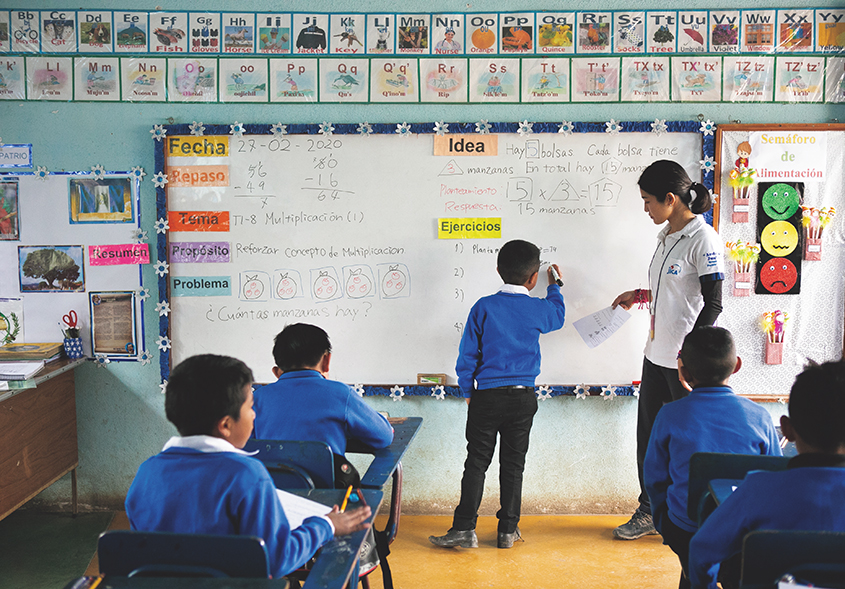
A Japan Overseas Cooperation Volunteer (JOCV) teaching math to students at an elementary school in Guatemala (Photo: JICA)
In Part II, in relation to Japan’s development cooperation Note 1 around the world, Japan’s recent efforts regarding three key issues will be introduced. These three issues are “1. Cooperation aimed at achieving ‘quality growth,’” “2. Sharing universal values and realizing a peaceful and secure society,” and “3. Promoting efforts to address global issues and human security.”
1. Cooperation Aimed at Achieving “Quality Growth”
In order for developing countries to achieve economic growth aimed at self-reliant development, it is essential that the growth is “quality growth.” “Quality growth” is “inclusive,” wherein the fruits of growth are shared with the society as a whole, leaving no one behind. At the same time, it must be “sustainable” in that growth can be sustained in harmony with society and the environment and “resilient” against economic crises, natural disasters, and other shocks. These are some of the challenges that Japan has tackled in its postwar history. Japan is providing support to enable developing countries to achieve “quality growth” by utilizing its experience, expertise, lessons learned, and technology.
(1) Development of Industrial Infrastructure and Industries and Economic Policy
In order to achieve “quality growth,” it is important to improve the socio-economic infrastructure that serves as the foundation for development. Moreover, it is crucial that the private sector plays a key role, and it is indispensable to boost private sector activities, such as the development of industries and the expansion of trade and investment. In developing countries, however, it can sometimes be difficult to develop capacities or set in place an environment for promoting trade and attracting private investment. Thus, support from the international community is required.
● Japan’s Efforts
... Quality Infrastructure
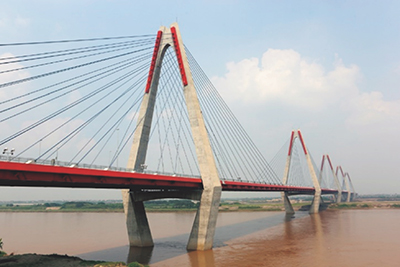
Nhat Tan Bridge in Viet Nam built with Japanese ODA loan (Photo: JICA)
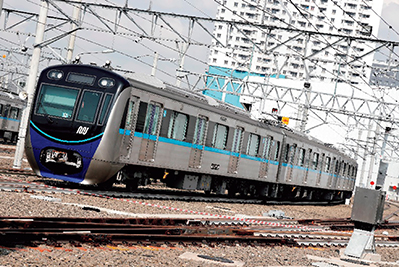
New car model of Indonesia’s Jakarta Mass Rapid Transit (MRT) that opened in March 2019. The transit system was completed by fully integrating Japanese technology and operating know-how. (Photo: JICA)
Developing countries continue to have an enormous demand for infrastructure. It is forecasted that the infrastructure supply and demand gap by 2040 is approximately $15 trillion (source: G20 Global Infrastructure Hub [GIH]). However, it is essential to promote quality infrastructure focusing not only on quantity but also on quality to achieve “quality growth” in developing countries.
Specifically, when investing in infrastructure, it is important that openness, transparency, economic
efficiency in view of life-cycle cost, and macro (country)-level debt sustainability be secured to develop “quality infrastructure” that genuinely contributes to “quality growth.” Furthermore, it is crucial that infrastructure is not only safe and resilient against disasters, but is also inclusive, leaving no one behind, and is sustainable with considerations given to social and environmental impacts. Japan develops “quality infrastructure” in line with the economic and development strategies of developing countries and trains human resources to maintain and operate the infrastructure. Japan’s strength lies in helping develop infrastructure that is truly contributory to “quality growth” in developing countries, which also includes technology transfer and job creation.
The “G7 Ise-Shima Principles for Promoting Quality Infrastructure Investment,” which was agreed on at the G7 Ise-Shima Summit in 2016, is positioned as the first step toward sharing the recognition on the basic elements of “quality infrastructure investment,” or investment for the development of infrastructure that contributes to “quality growth.” Furthermore, the importance and various elements of quality infrastructure investment were also agreed upon at the G20 Hangzhou Summit held under China’s Presidency. Based on the agreements by the G7 and the G20 thus far, discussions were carried out at G20 meetings under Japan’s Presidency toward formulating principles to maximize the positive impacts brought about by infrastructure investment on the economy, environment, society, and development, while newly incorporating components such as strengthening infrastructure governance, including debt sustainability at the country level. As a result, at the Osaka Summit held in June 2019, the leaders of the G20, including emerging donors, endorsed the “G20 Principles for Quality Infrastructure Investment,” which incorporated elements such as (i) openness, (ii) transparency, (iii) economic efficiency in view of life-cycle cost, and (iv) debt sustainability as principles that show the common strategic direction and vision concerning future quality infrastructure investment. In order to promote the G20 Principles, the Organisation for Economic Co-operation and Development (OECD) prepared the “OECD Compendium of Policy Good Practices for Quality Infrastructure Investment,” a document compiling the matters that should be considered by countries when developing and implementing policies. In November 2020, Japan and the OECD co-organized an event to commemorate the completion of the Compendium, at which Parliamentary Vice-Minister for Foreign Affairs Nakanishi delivered remarks regarding the importance of quality infrastructure investment. Since then, the importance of quality infrastructure investment has been confirmed at bilateral meetings and various multilateral conferences.
In this context, at the Japan-ASEAN Summit Meeting in November 2020, Japan launched the “Japan-ASEAN Connectivity Initiative” with a focus on quality infrastructure projects worth ¥2 trillion and announced that it would help strengthen land, sea, and air corridor connectivity through infrastructure development together with human resources development of 1,000 individuals in three years.
In order to achieve quality growth globally, the Government of Japan will continue to promote the “G20 Principles for Quality Infrastructure Investment” across the international community. Moreover, Japan will cooperate with countries around the world, including in Asia, as well as international organizations, such as the World Bank, the Asian Development Bank (ADB), and the OECD, to make efforts to implement “quality infrastructure investment.”
India
Project on Champions for Societal Manufacturing
Technical Cooperation Project (April 2013 – (ongoing))
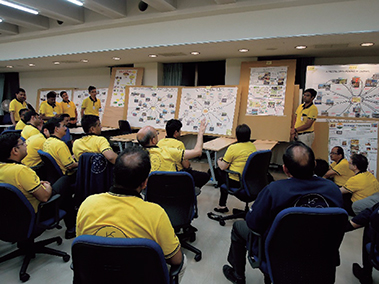
Training participants presenting their business plans and exchanging opinions for waste management in India based on what they learned during their training in Japan (Photo: JICA)
The Government of India is focusing on strengthening its manufacturing sector for further economic growth of the country. One of the challenges is the shortage of human resources who can serve as senior managers in the manufacturing sector. In recent years, new social needs such as responses to environmental pollution and resource conservation as well as business development targeted at the poor have emerged, and thus it is important to train senior managers who can respond to these new changes for the sustainable and comprehensive development of the industry.
This project is based on the framework of the Visionary Leaders For Manufacturing (VLFM) Program*, which was established under the “VLFM Project” conducted by Japan from 2007 to 2013. Up until now, leveraging Japan’s manufacturing experience, the project has developed human resources with the skills to lead the manufacturing sector by providing human resource development assistance to more than 1,000 companies and training more than 1,200 senior and middle managers across India.
In addition to dispatching experts from Japan to provide technical knowledge and skills regarding how to improve cooperation between vendors of product parts and their subcontractors, there are also training courses that include environmental friendliness and focus on growth where no one will be left behind. Furthermore, the project offers training programs in Japan in order to convey the spirit of Japanese-style manufacturing and management methods and contributes to transforming the awareness of the participating senior management candidates through visits to manufacturing sites and research and presentations on Japanese society and culture.
This project has received extremely high praise from the Government of India, and it is expected to strengthen the foundation for India’s manufacturing sector through promoting Japanese-style management methods.
*The program consists of the Senior Managers Course targeting senior and middle managers, the Middle Managers Course targeting middle manager candidates with manufacturing sector experience (degree-accredited program at graduate schools), and the VSME Course targeting subcontracting SMEs.
... Improving the Trade and Investment Environment
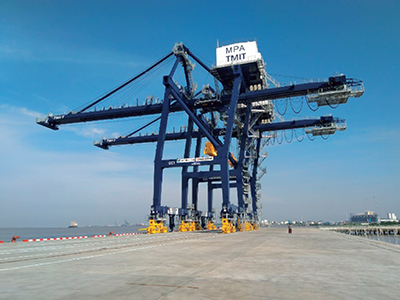
Thilawa Port in Myanmar constructed with Japanese ODA loan. The port serves as a gateway to the Thilawa Special Economic Zone (SEZ) developed with Japanese public and private sector involvement. (Photo: JICA)
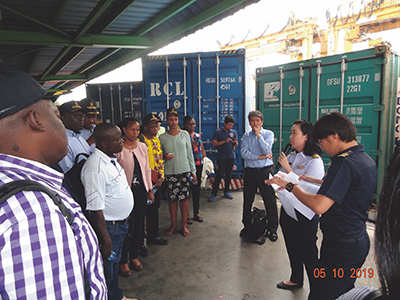
Customs officials from East African countries visiting customs in Thailand and listening to experts under the Project on Capacity Development for Trade Facilitation and Border Control in East Africa (Photo: JICA)
Japan utilizes ODA and Other Official Flows (OOF)* to support the development of small and medium-sized enterprises (SMEs), transfer of Japan’s industrial technology, and formulation of economic policies in developing countries. In addition, Japan supports the development of the trade and investment environment and economic infrastructures in order to enhance the export capabilities and competitiveness of developing countries.
At the Seventh Tokyo International Conference on African Development (TICAD7) held in Yokohama in August 2019, the focus of discussion was business promotion, and the Public-Private Business Dialogue was held as one of the six plenary sessions. It was the first face-to-face dialogue in the history of TICAD between the public and private sectors from both Africa and Japan, positioning private companies as official partners. At the session, concrete suggestions were put forward for expanding trade and investment between Japan and Africa, and strong expectations were expressed toward expansion of Japan’s direct investment and support for private-sector development, including human resources development in Africa. In addition, then Prime Minister Abe stated that the Government of Japan would exert every effort to further increase private investment in Africa, which was at a level of $20 billion over the past three years.
In 2020, business between Japan and Africa temporarily stagnated as overseas travel became difficult due to COVID-19. Although there were initial fears of cases exploding in Africa, the disease spread relatively slowly and the mortality rate remained low, as African countries quickly strengthened their border control measures and restrictions on domestic travel. Under these circumstances, in autumn 2020, regular commercial flights resumed in many countries, and Japanese company employees began to return to their assignments in Africa. Japanese companies operating in the continent are exploring business opportunities during and after COVID-19 while preventing infection. To encourage this trend, the Government of Japan will continue to make every effort to support the expansion of Japanese companies into Africa by promoting industrial human resources development as well as innovation and investment.
In addition, the World Trade Organization (WTO) emphasizes the significance of promoting the development of developing countries through their participation in the multilateral free trading system. Japan has contributed to, for example, the International Trade Centre (ITC), which is an international organization specializing in Aid for Trade (AfT)*, with an aim to strengthen the capacity of developing countries to engage in trade negotiations and participate in the global market, and to raise their ability to implement the WTO agreements.
With regard to access to the Japanese market, Japan has implemented the Generalized System of Preferences (GSP), which applies tariff rates that are lower than the general tariff to products originating from developing countries. Furthermore, for the Least Developed Countries (LDCs)*, Japan applies duty-free quota-free access*by introducing a special preferential treatment. Through these schemes, Japan intends to encourage the import of products from developing countries. Moreover, Japan is actively promoting Economic Partnership Agreements (EPAs)* and investment agreements, and it is expected that facilitation of business environment through liberalization and protection of trade and investment will encourage Japanese companies to advance into markets in developing countries, and by extension, contribute to economic growth in developing countries.
Discussions regarding AfT have intensified in various international organizations, including the WTO and the OECD, as a means of further promoting support from developed countries, such as that of Japan. Japan is providing funds for the development of transportation networks, including ports, roads, and bridges, as well as for projects to construct facilities such as power plants and power grids, all of which are vital for developing countries to engage in trade. Japan is also implementing technical cooperation in trade-related areas, including the training of customs officials and intellectual property rights experts.
Regarding support for customs in developing countries, mainly ASEAN member states, among such technical cooperation, Japan has actively provided support aimed at improving the capacity of customs in developing countries through sharing of Japan’s expertise and skills in customs. Through contributions to the World Customs Organization (WCO), Japan supports capacity building activities implemented by the WCO and helps to facilitate international trade while securing safety through promoting the introduction and wider adoption of WCO tools and best practices. In addition, Japan dispatches its customs officials as JICA long-term experts to six ASEAN countries Note 2 to provide support tailored to the needs of individual fields. In Africa, under a JICA/WCO joint project, Japan is implementing a program to train instructors who will play leading roles in customs administrations in various countries.
Furthermore, Japan provides assistance to small-scale production groups and small companies in developing countries over the “One Village, One Product Campaign.”* In addition, to attract private sector investment in developing countries, Japan advances support by identifying unique challenges in those countries and by offering recommendations or advice to local governments. Moreover, the implementation of the “Trade Facilitation Agreement (TFA),”* which entered into force in February 2017, is expected to improve the challenging situations Japanese companies frequently face at export destinations, such as lack of transparency and arbitrary application of trade procedures, and to boost trade and other economic activities by Japanese companies, which not only export finished goods, but also develop supply chains on a global scale. In addition, its implementation is expected to help developing countries to expand trade and investment by reducing trade transaction costs, prevent illegal exports, and improve the collection of customs duties.
... Support for Mobilization of Domestic Resources
In order to enable developing countries to achieve quality growth by resolving various development issues under their ownership, it is critical that developing countries ensure the necessary development funds in the form of tax revenue collection or others with their own capacities. This is known as “domestic resource mobilization.” Its importance has been noted at the discussion fora of the United Nations (UN), OECD, G7, G20, International Monetary Fund (IMF), and multilateral development banks (MDBs)*. This issue is also brought up in the “2030 Agenda for Sustainable Development (2030 Agenda).”
Japan, together with the international organizations and other entities concerned, is contributing to discussions regarding domestic resource mobilization and providing relevant support to developing countries. For example, Japan proactively provides technical cooperation to developing countries for improving their tax administration. In 2020, Japan dispatched National Tax Agency personnel as lecturers on topics including tax audits, base erosion and profit shifting (BEPS), and trial work Note 3 to Myanmar, the Philippines, and Indonesia. In addition to these programs implemented with international organizations, Japan has assisted the development of the “OECD Global Relations Programme” for more than 20 years. This Programme dispatches experts to developing countries in the relevant fields of tax treaties Note 4 and investigation of the taxes of multinational enterprises to conduct seminars and lectures to deepen the understanding of taxation systems and tax enforcement. Japan also provides cooperation on the human resources, expertise, and financing for technical assistance provided by the IMF and ADB in the field of taxation, including domestic resource mobilization, thereby contributing to strengthening capabilities in the field of taxation in developing countries including Asia.
In recent years, public opinion has taken an increasingly critical view toward the involvement of the wealthy class and multinational enterprises in international tax avoidance. The World Bank and ADB, for example, have introduced systems for examining private sector investment projects in this regard. Using such systems, they may cancel project formulation if zones recognized as lacking in tax transparency, such as unclarity of effective tax information, are used as investment transit points. Investment through MDBs is one of the important tools for the growth of developing countries. Hence, support to enhance the transparency of taxes in developing countries is becoming ever more essential from the perspective of financing for development as well.
Furthermore, the outcomes of the OECD/G20 BEPS Project*, which was launched in 2012 by OECD’s Committee on Fiscal Affairs to prevent aggressive tax planning measures by multinational enterprises, are also important for the sustainable development of developing countries. Cooperation among countries to implement the outcomes of this project will improve the transparency of companies and governments, and appropriate taxation will become possible in places where economic activities take place. Developing countries will be able to respond to the tax avoidance of multinational enterprises appropriately and impose and collect tax properly in their own countries. At the same time, their tax systems and tax administration will be in line with international standards, and a stable, highly predictable, and attractive investment environment will be created for companies and investors. At present, more than 139 countries and regions, including developing countries, are participating in the framework that implements measures recommended under the BEPS Project.
... Finance
A sound and stable financial system, coupled with smooth financial and capital markets, forms an essential foundation for the sustainable economic development of developing countries. As financial globalization advances, it is pivotal that financial systems in emerging countries are properly established and that assistance is provided for the development of sound financial markets.
Based on this concept, in February 2020, the Financial Services Agency (FSA) invited officials in securities regulatory authorities from developing countries, including from Asia, to a training program conducted by FSA officials and others in Japan. This training program covered areas such as the initiatives as well as the regulatory and supervision systems in Japan’s securities sector.
Glossary
- *Other Official Flows (OOF)
- OOF refers to flows of funds to developing countries from governments, which are not considered as ODA because their main purpose is not development, the leniency of their conditions does not reach the standards, and/or other reasons. Examples include export credit, direct investment by governmental financial institutions, and financing to international organizations.
- *Aid for Trade (AfT)
- AfT is assistance provided to developing countries to improve trade-related capabilities and to develop infrastructure for the purpose of achieving economic growth and poverty reduction through trade in developing countries under the WTO’s multilateral trading system.
- *Least Developed Countries (LDCs)
- According to the classification by the UN, LDCs are countries particularly behind in development compared to other developing countries based on their income levels. LDCs meet certain criteria, including gross national income (GNI) per capita of $1,025 or less on average between 2014 and 2016. As of 2020, there are 46 eligible countries: 7 in Asia, 2 in the Middle East, 33 in Africa, 1 in Latin America, and 3 in Oceania.
- *Duty-free quota-free access
- A measure to make products imported from LDCs tariff free and without any import quotas. Japan has been expanding the number of applicable products under this measure, and approximately 98% of all products can be imported under such conditions.
- *Economic Partnership Agreement (EPA)
- EPAs are agreements for strengthening a wide range of economic relations, incorporating not only elements of Free Trade Agreements (FTAs) that are aimed at reducing and eliminating tariffs on goods and barriers to trade in services between specific countries and regions, but also elements of cooperation in various sectors such as investment, movement of persons, protection of intellectual property, and rulemaking on competition policy. These agreements are expected to further vitalize trade and investment between countries and accelerate economic growth.
- *One Village, One Product Campaign
- The One Village, One Product Campaign is an initiative, which was launched in Oita Prefecture, Japan in 1979 and prevails globally, that aims to create jobs and to revitalize local communities through promoting unique products that take advantage of local resources and traditional techniques. In Asia and Africa, this Campaign facilitates expanding exports of developing countries’ products by discovering attractive goods, such as handcrafts, textiles, and toys that represent the unique ethnic characteristics of those countries and by reaching out to a wider range of people.
- *Trade Facilitation Agreement (TFA)
- The TFA is an agreement that stipulates the simplification and enhanced transparency of customs procedures aimed at trade promotion, and entered into force in February 2017. The TFA is the first newly-created multilateral agreement that has gained the participation of all WTO member states since its founding in 1995. According to the WTO, full implementation of the TFA could reduce the trade costs of member states by an average of 14.3% and increase global export of goods by over $1 trillion.
- *Multilateral development banks (MDBs)
- MDBs is a collective term for international organizations that provide comprehensive support for poverty reduction and sustainable economic and social development in developing countries through financial assistance, technical assistance, and intellectual contributions. The term MDBs generally refers to the World Bank Group, which provides support worldwide, and to four regional development financial institutions that provide support to their respective regions, namely, the ADB, the Inter-American Development Bank (IDB), the African Development Bank (AfDB), and the European Bank for Reconstruction and Development (EBRD).
- *OECD/G20 BEPS Project
- Base erosion and profit shifting (BEPS) refers to the issue of multinational enterprises’ aggressive tax planning measures that exploit gaps and loopholes in international tax systems, including tax treaties, in order to intentionally reduce the tax burden for economic activities that should have been taxed. In order to address this issue, the BEPS Project was launched in June 2012 by the OECD’s Committee on Fiscal Affairs (led by a Japanese Chair until the end of 2016), with the aim of ensuring fair competition and making international taxation rules conform with the situation of the global economy and company trends, as well as reviewing international taxation rules across the board in order to raise transparency among all governments and global companies. As of February 2021, more than 139 countries and regions are participating in the Inclusive Framework on BEPS. As of December 2020, 93 countries and regions have signed the “Multilateral Convention to Implement Tax Treaty Related Measures to Prevent Base Erosion and Profit Shifting (Multilateral Instrument: MLI),” and 59 countries and regions including Japan have concluded the Convention.
- Note 1: Here, the term “development cooperation” refers to “international cooperation activities conducted by the Government and related organizations for the main purpose of development in developing regions,” including ODA and other cooperation conducted in collaboration with public-private financing and activities.
- Note 2: The six countries are: Cambodia, the Philippines, Malaysia, Myanmar, Laos, and Thailand.
- Note 3: Work to evaluate the propriety of fact-finding in the taxation concerned and to examine whether laws, regulations, and notifications are properly applied to the action.
- Note 4: Bilateral treaties for avoiding double taxation on income, as well as preventing the avoidance or evasion of taxes on income.
